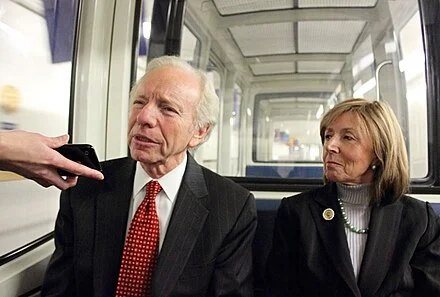Chris Powell: Lieberman often brilliantly navigated around the political shoals
Sen. Joe Lieberman and his wife, Hadassah, riding the United States Capitol subway system in 2011
MANCHESTER, Conn.
Joe Lieberman was Connecticut's most consequential politician of his era, holding high office in the state for 40 of the 42 years between 1971 and 2013, 24 of those in the U.S. Senate. He was also often an insurgent and sometimes crossed his party's establishment in a big way but got away with it, probably because he was calm and genial and quietly exuded integrity even when causing controversy.
Lieberman's involvement in politics began in New Haven with the anti-Vietnam war campaigns of 1968 and 1970, when he was not long out of Yale University. He shocked observers by winning a primary against the state Senate's Democratic majority leader, Edward L. Marcus, of New Haven, who had been distracted by his campaign for U.S. senator.
Instantly Lieberman was a star. Soon he was Senate Democratic majority leader. His ascent was stalled by his defeat for the U.S. House from the New Haven district in 1980 after a terrible campaign. But he remained so well regarded that he easily won the party's nomination for state attorney general, in 1982, whereupon he transformed the office into what it is almost everywhere now -- a noisy platform as "the people's lawyer," hectoring and suing bad guys and gaining spectacular publicity if not spectacular results.
The attorney general's office offered Lieberman a double opportunity -- not just for constant publicity but also, in 1988, for challenging Connecticut's Republican U.S. senator, Lowell P. Weicker Jr., without having to risk losing the attorney general's office, where his term extended to 1990.
After three terms in the Senate Weicker had a national reputation, gained first by denouncing President Richard Nixon, a fellow Republican, amid the Watergate scandal, then by slighting Republicans in other situations as Connecticut became more Democratic. Republicans resented renominating Weicker and Lieberman saw his chance. Since his liberal credentials were solid, he struck some conservative poses to appeal to Republicans sick of Weicker, who notably included National Review editor and columnist William F. Buckley Jr., a Connecticut resident.
Republican defections to Lieberman were probably decisive, as he won by just 10,000 votes, seven-tenths of a percentage point.
In the Senate Lieberman was a reliably liberal Democratic vote, and he easily won re-election in 1994. But in 1998 he had the nerve, rare among Democrats, to scold President Bill Clinton, also a Democrat, for his affair with an intern in the White House. While Lieberman voted against Clinton's impeachment, his criticism of a president from his own party was taken as evidence of integrity. So when the Democrats nominated Vice President Al Gore to succeed Clinton as president in 2000, Gore chose Lieberman as his vice-presidential running mate in large part to signify some independence from Clinton.
Gore and Lieberman won the popular vote but lost the electoral vote. Lieberman simultaneously ran for re-election to the Senate in Connecticut and easily won again.
Lieberman's support for the U.S. war against Iraq in pursuit of imaginary "weapons of mass destruction" cost him renomination by the Democrats in a primary in 2006 narrowly won by Ned Lamont, now governor. But running as an independent and receiving most Republican votes, Lieberman easily won re-election and remained in the Senate Democratic caucus.
The next year Lieberman supported Republican Sen. John McCain for president over the Democratic nominee, Barack Obama. Still the Senate Democratic caucus didn't dare expel him.
Lieberman worked well enough with Obama, though he has been blamed or credited for keeping a "public option" out of the "Obamacare" national health-insurance legislation, something perhaps to be expected from a senator from a state with a big insurance industry.
Lieberman retired from the Senate in 2013, but when he died March 27 at 82 he was still much involved in politics through the No Labels movement, trying to recruit a presidential ticket to provide an alternative to the awful Joe Biden and Donald Trump. In any event, No Labels gave up that effort.
Chris Powell has written about Connecticut government and politics for many years (CPowell@cox.net).
